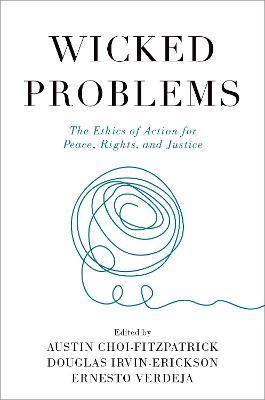Wicked Problems: The Ethics of Action for Peace, Rights, and Justice

Wicked Problems: The Ethics of Action for Peace, Rights, and Justice
The ethics of changemaking and peacebuilding may appear straightforward: advance dignity, promote well-being, minimize suffering. Sounds simple, right? Actually acting ethically when it really matters is rarely straightforward. If someone engaged in change-oriented work sets out to do good, how should we prioritize and evaluate whose good counts? And, how ought we act once we have decided whose good counts? Practitioners frequently confront dilemmas where dire situations may demand some form of response, but each of the options may have undesirable consequences of one form or another. Dilemmas are not merely ordinary problems, they are wicked problems: that is to say, they are defined by circumstances that only allow for suboptimal outcomes and are based on profound and sometimes troubling trade-offs. Wicked Problems argues that the field of peacebuilding and conflict transformation needs a stronger and more practical sense of its ethical obligations. For example, it argues against posing false binaries between domestic and international issues and against viewing violence and conflict as equivalents. It holds strategic nonviolence up to critical scrutiny and shows that do no harm approaches may in fact do harm. The contributors include scholars, scholar practitioners in the field, and activists on the streets, and the chapters cover the role of violence in conflict; conflict and violence prevention and resolution; humanitarianism; community organizing and racial justice; social movements; human rights advocacy; transitional justice; political reconciliation; and peace education and pedagogy, among other topics. Drawing on the lived experiences and expertise of activists, educators, and researchers, Wicked Problems equips readers to ask--and answer--difficult questions about social change work.
The ethics of changemaking and peacebuilding may appear straightforward: advance dignity, promote well-being, minimize suffering. Sounds simple, right? Actually acting ethically when it really matters is rarely straightforward. If someone engaged in change-oriented work sets out to do good,
how should we prioritize and evaluate whose good counts? And, how ought we act once we have decided whose good counts? Practitioners frequently confront dilemmas where dire situations may demand some form of response, but each of the options may have undesirable consequences of one form or another.
Dilemmas are not merely ordinary probl
PRP: 274.77 Lei
Acesta este Prețul Recomandat de Producător. Prețul de vânzare al produsului este afișat mai jos.
247.29Lei
247.29Lei
274.77 LeiLivrare in 2-4 saptamani
Descrierea produsului
The ethics of changemaking and peacebuilding may appear straightforward: advance dignity, promote well-being, minimize suffering. Sounds simple, right? Actually acting ethically when it really matters is rarely straightforward. If someone engaged in change-oriented work sets out to do good, how should we prioritize and evaluate whose good counts? And, how ought we act once we have decided whose good counts? Practitioners frequently confront dilemmas where dire situations may demand some form of response, but each of the options may have undesirable consequences of one form or another. Dilemmas are not merely ordinary problems, they are wicked problems: that is to say, they are defined by circumstances that only allow for suboptimal outcomes and are based on profound and sometimes troubling trade-offs. Wicked Problems argues that the field of peacebuilding and conflict transformation needs a stronger and more practical sense of its ethical obligations. For example, it argues against posing false binaries between domestic and international issues and against viewing violence and conflict as equivalents. It holds strategic nonviolence up to critical scrutiny and shows that do no harm approaches may in fact do harm. The contributors include scholars, scholar practitioners in the field, and activists on the streets, and the chapters cover the role of violence in conflict; conflict and violence prevention and resolution; humanitarianism; community organizing and racial justice; social movements; human rights advocacy; transitional justice; political reconciliation; and peace education and pedagogy, among other topics. Drawing on the lived experiences and expertise of activists, educators, and researchers, Wicked Problems equips readers to ask--and answer--difficult questions about social change work.
The ethics of changemaking and peacebuilding may appear straightforward: advance dignity, promote well-being, minimize suffering. Sounds simple, right? Actually acting ethically when it really matters is rarely straightforward. If someone engaged in change-oriented work sets out to do good,
how should we prioritize and evaluate whose good counts? And, how ought we act once we have decided whose good counts? Practitioners frequently confront dilemmas where dire situations may demand some form of response, but each of the options may have undesirable consequences of one form or another.
Dilemmas are not merely ordinary probl
Detaliile produsului











